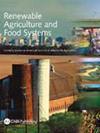“他们皈依了,我也皈依了”:邻里效应和茶农皈依有机农业的意图
IF 2
3区 农林科学
Q2 AGRICULTURE, MULTIDISCIPLINARY
引用次数: 1
摘要
摘要本研究旨在分析邻里效应(NE)对越南北部山区茶农从传统农业向有机农业转变意愿的影响。它与以往的研究有两个方面的不同。首先,我们结合计划行为理论和羊群行为理论来解释农民从传统农业向有机农业转变的意图,重点关注NE的影响。其次,为了测量NE,我们使用了McCartney和Shah的问卷调查和羊群行为测量方法相结合的方法。利用广义结构方程模型和从泰阮263名茶农收集的数据,我们发现,在邻居都住在附近并且与主体关系密切的情况下,NE对农民转向有机茶生产的意愿有积极而直接的显著影响。此外,它还通过态度、主观规范和感知行为控制间接影响农民的转换意愿。为了鼓励茶农转向有机农业,政策制定者和推广工作者应该利用NE来增强农民对有机农业成功的好处和可能性的信心。本文章由计算机程序翻译,如有差异,请以英文原文为准。
‘They convert, I also convert’: the neighborhood effects and tea farmers' intention to convert to organic farming
Abstract This study aims to analyze the influence of neighborhood effects (NE) on tea farmers' intention to convert from traditional to organic farming in the mountainous areas of northern Vietnam. It differs from previous studies in two aspects. First, we combine the theory of planned behavior and the theory of herd behavior to explain farmers' intention to convert from traditional to organic farming, focusing on the impact of the NE. Secondly, to measure NE, we use a combination of questionnaires and methods of measuring herd behavior by McCartney and Shah. Using the generalized structural equation modeling and data collected from 263 tea farmers in Thai Nguyen, we found that NE has a positive and direct significant effect on farmers' intention to convert to organic tea production in the case where neighbors both live nearby and have a close relationship with the subject. In addition, it indirectly impacts farmers' conversion intention through attitude, subjective norms and perceived behavior control. To encourage tea farmers to convert to organic farming, policymakers and extension workers should take advantage of the NE to increase farmers' confidence about the benefits and the possibility of successful organic farming.
求助全文
通过发布文献求助,成功后即可免费获取论文全文。
去求助
来源期刊

Renewable Agriculture and Food Systems
农林科学-农业综合
CiteScore
5.20
自引率
7.40%
发文量
39
审稿时长
>36 weeks
期刊介绍:
Renewable Agriculture and Food Systems (formerly American Journal of Alternative Agriculture) is a multi-disciplinary journal which focuses on the science that underpins economically, environmentally, and socially sustainable approaches to agriculture and food production. The journal publishes original research and review articles on the economic, ecological, and environmental impacts of agriculture; the effective use of renewable resources and biodiversity in agro-ecosystems; and the technological and sociological implications of sustainable food systems. It also contains a discussion forum, which presents lively discussions on new and provocative topics.
 求助内容:
求助内容: 应助结果提醒方式:
应助结果提醒方式:


